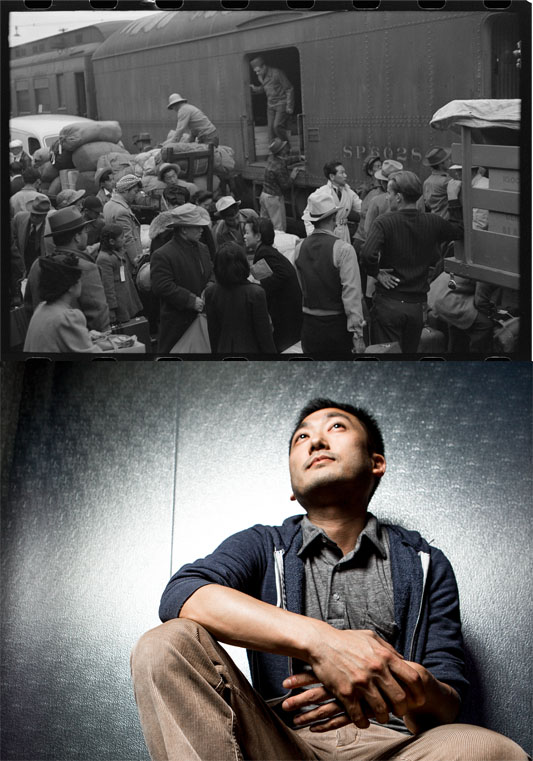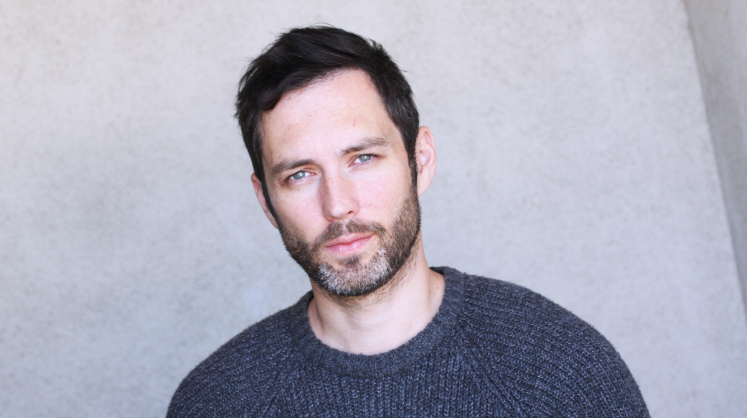From top to bottom: Japanese Americans headed for Owens Valley gather around baggage car at the old Santa Fe Station; Eugene Sun Park. (Photos courtesy of Joe Mazza/Brave Lux Photography and the Library of Congress)
by KARIN CHAN
editor@charactermedia.com
A Chicago-based nonprofit founded by a Korean American independent filmmaker and producer has been awarded a $160,000 grant to create a 20-minute dramatic narrative about the Japanese American internment experience during World War II.
The Orange Story: An American Tale, a production of Full Spectrum Features founded by Eugene Sun Park, chronicles the so-called “day of removal” in 1942 following an order authorizing the forced relocation of 120,000 ethnic Japanese from their homes.
 Japanese American evacuation from West Coast areas under U.S. Army war emergency order. Waiting with their luggage at the old Santa Fe station for a train to take them to Owens Valley. (Photo courtesy of Library of Congress)
Japanese American evacuation from West Coast areas under U.S. Army war emergency order. Waiting with their luggage at the old Santa Fe station for a train to take them to Owens Valley. (Photo courtesy of Library of Congress)
The grant is part of the National Park Service’s efforts to preserve the stories and sites of Japanese American internment; this year, a total $2.8 million has been awarded to fund a range of projects.
In a phone interview with KoreAm, Park said the film, directed by Erika Street, is the first phase of a three-year project that will also include an educational website featuring five different short films and personal stories about the Japanese internment through the use of multimedia.
Park, 37, was born in Michigan but moved with his family to New Jersey when he was 5. He grew up in a school district where he was one of only a few Asian Americans. Even at a young age, Park was aware of his outsider status.
“My family stood out,” he recalls. “I don’t remember how many times people referred to me as ‘the nice Chinese boy.’ This was the ’80s—the words ‘Chinese’ and ‘Asian’ were synonymous. My sense of being Asian American or Korean American was a point of embarrassment rather than filling me with any sense of pride. Like most kids, I just wanted to fit in.”
 Japanese American child who is being evacuated with his parents to Owens Valley. (Photo courtesy of the Library of Congress)
Japanese American child who is being evacuated with his parents to Owens Valley. (Photo courtesy of the Library of Congress)
The experiences of his youth would guide Park into making experimental and narrative films about “unconventional topics, forms, subjects and points-of-view,” as Full Spectrum Features’ website states.
Park’s past works include 2015’s Self-Deportation: The Untold Tale of a Marginal Woman, about an Asian American woman “who crosses over into a surreal world after a series of strange encounters on the subway” and 2012’s 15-minute short, 1000 Li, which centers around a Korean American seminary student disrupted by an upstairs neighbor.
Park says he’s turning his sights on the Japanese American internment experience for his next major project because he feels it’s an important part of history that Americans can learn from.
“I see the mistreatment of Japanese Americans as connected to exclusionary laws that targeted Asian Americans, including Korean Americans,” Park says. “I would like this history told and want my children to hear about this story in schools.”
Asian Americans, Park notes, are oftentimes treated as “a footnote in U.S. history,” with their struggles mentioned in only one line in textbooks.
With Orange Story, which Park is producing, he adds, “We are trying to capture that extreme degree of uncertainty—having your status changed from a free civilian to a prisoner of war for no other reason than because of your heritage.”
 Japanese Americans leaving for Owens Valley under the U.S. Army war emergency order. (Photo courtesy of the Library of Congress)
Japanese Americans leaving for Owens Valley under the U.S. Army war emergency order. (Photo courtesy of the Library of Congress)
The Chicago resident wants a U.S. audience to view the Asian American characters in the film not as foreigners irrelevant to the fabric of U.S. history, but as Americans who suffered a great injustice—hence, the title incorporating, “An American Tale.”
Park is modeling Orange Story after 12 Years a Slave, the 2013 narrative film adapted from a slave memoir and told from the slave’s point of view. “A lot of historians were excited about it because it put a nonwhite protagonist in the story, instead of a white person freeing the blacks,” Park says.
Similarly, with Orange Story, the producer plans to take an important period in American history and put Japanese American characters front and center so they are active agents in their story as opposed to secondary characters.
The short film will be shot in Chicago and California and is set for a spring 2016 release.
“This is an important film for [Americans] to watch because Japanese internment represents one of the most significant violations of civil rights,” Park says. “Watching a dramatic narrative that emphasizes a personal story will make people care about it on an emotional level much more than statistics in a documentary.”
___







